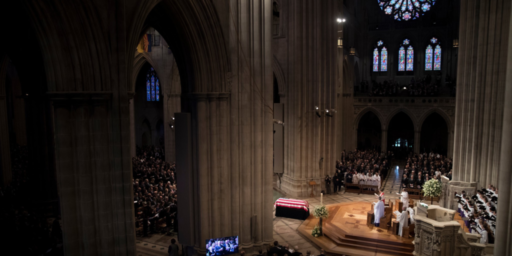Blogging Elitism
Fellow Jacksonville State alumnus Stacy McCain has noted something odd about The Atlantic‘s growing stable of bloggers: Without exception, they have Ivy League degrees. Indeed, until Megan McArdle’s recent hire, they were all Harvard grads. (Megan, with a mere Penn BA and Chicago MBA, broke the glass ceiling.)
For some years now, bloggers have been portrayed (and have portrayed themselves) as grass-roots outsiders, rebels storming the privileged bastions of the journalistic elite. I’m not sure that image was ever accurate, and the hierarchy of the blogosphere is probably becoming more elitist every day, as more establishment organizations seek to carve out a place in the medium.
McCain notes that even the original Wonkette, Ana Marie Cox, has degrees from Chicago and Berkeley.
Almost all the top bloggers have graduate or professional degrees, mostly from elite schools. As I’ve noted many times over the years (see, for example, “Professionalization of the Blogosphere“), it stands to reason that the blogosphere would be dominated by academics and lawyers, who tend to have both the intellectual training and the time available to spend large chunks of their day processing information and churning out interesting commentary on it. The pure hobbyists like John Amato and Ed Morrissey, who have achieved huge readership simply through passion and hard work, are exceptional, indeed.
That the Atlantic, arguably the most elite of the general interest policy magazines, would tend to hire Ivy League graduates shouldn’t be surprising, even if its uniformity in doing so is. And, even as a man with three degrees from decidedly unprestigious state schools, I must admit that they’ve put together quite a talented collection of bloggers. All but Fallows, who didn’t so far as I know have a blog previously, were on my reading list before they were assembled under a single masthead.





I don’t see how discovering that bloggers have degrees is relevant.
If the discovery was that bloggers had journalism degrees or years of experience as intrepid cub reporters, that might be interesting.
The blogosphere emulates real life. Still, up-and-comers have the opportunity to garner an audience with talent some self-promotion ability, and luck.
What’s more important is to ensure that the blogosphere stays open with open comments and trackbacks. If the elite block off these things, it will be harder for smaller bloggers to respond to them. It can be rather discouraging when a big name blogger picks out a single, tongue-in-cheek post of yours and roasts you out of context. At best, you can defend yourself today by going to the comments and pointing that out, but some bloggers like Powerline’s crew have already cut out comments as well.
Now, if they do this, then at what point do these people stop being bloggers and start becoming contributors to the greater content machine at The Atlantic? I think that is a fair question. Where is the dividing mark?